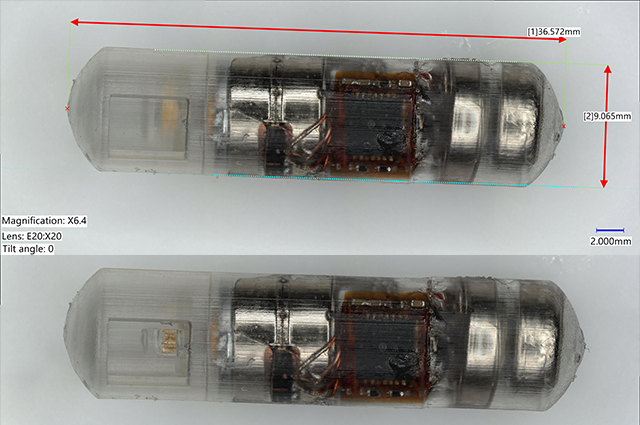Inaugural winners of robotics challenge

Pulling together expertise from the undergraduate, graduate, postdoc, and faculty levels, a Tufts team recently won first prize at the inaugural MassRobotics Form and Function Challenge. Teams were tasked with creating a compelling robot that has an innovative and functional design. Competing against teams from 12 other universities from around the world, the Tufts team won the $25,000 first prize in the final competition. Their project? A robotic pill that can collect microbiome samples from the gut.
Research teams at Tufts often leverage expertise from a blend of students, faculty, and staff at different stages in their educational journeys. The winning Tufts team at the MassRobotics Form and Function Challenge included mechanical engineering undergraduate Ege Cogulu, E24, postdoctoral scholar Ruben Del-Rio-Ruiz, PhD student Cihan Asci, and Professor Sameer Sonkusale, all from the Department of Electrical and Computer Engineering.
The group came together to design and develop a working prototype of an ingestible capsule that simplifies the collection of gut microbiome samples. Current methods to obtain such samples are either unreliable or cause hardship for the patient. Stool samples analyze material that has passed fully through the digestive system and cannot provide information about which area of the gut may be affected with an issue. Other options include invasive procedures such as endoscopy or colonoscopy, where patients must undertake inconvenient and unpleasant preparations such as fasting and consuming laxatives. In hopes of eliminating some of these hardships, the team devised a more efficient and less intrusive solution for capturing samples.
Design and function were equally important criteria in the MassRobotics competition. The Tufts group nestled their technology inside a roughly 1.3-inch capsule, which users swallow like a regular pill. Once the pill reaches the small intestine, the protective coating that shields it from the acidic environment of the gut dissolves. The pill can then collect independent samples from various regions of the small intestine. Inside the capsule, the team placed a motorized system that rotates to allow for multiple samples to be obtained and stored in the capsule. Collecting more than one sample allows for comparative analysis between different areas of the gut microbiome, which could be useful for localized issues.
The pill passes naturally through the digestive system, eliminating the need for invasive procedures. Gut microbiome samples reveal what microorganisms are present in the gut and can help diagnose infectious and chronic gut disorders. Recent evidence also suggests that the gut microbiome may have an effect on several other organs within the body including the brain. Given the wide range of potential health problems with connections to the gut, the product aims to simplify the process of discovering and diagnosing these issues.
With a 2023 Tufts Summer Scholar position granted to Cogulu, and ongoing support from the National Institutes of Health, the team plans to optimize the functionalities and miniaturize the size of the winning pill design during the summer. Other research in Sonkusale’s Nano Lab focuses on developing cutting-edge technology for precision health such as smart bandages, surgical sutures, and microneedles.
MassRobotics was established in 2015 as a non-profit organization that fosters education, collaboration, and innovation in robotics. The Form and Function Challenge was part of the 2023 Robotics Summit & Expo in Boston, an educational and networking convention that brings together technical and business professionals to explore the future of robotics. While the organization has held industry-sponsored challenges in the past, this is the first year that MassRobotics ran the Form and Function Challenge.
Department:
Electrical and Computer Engineering